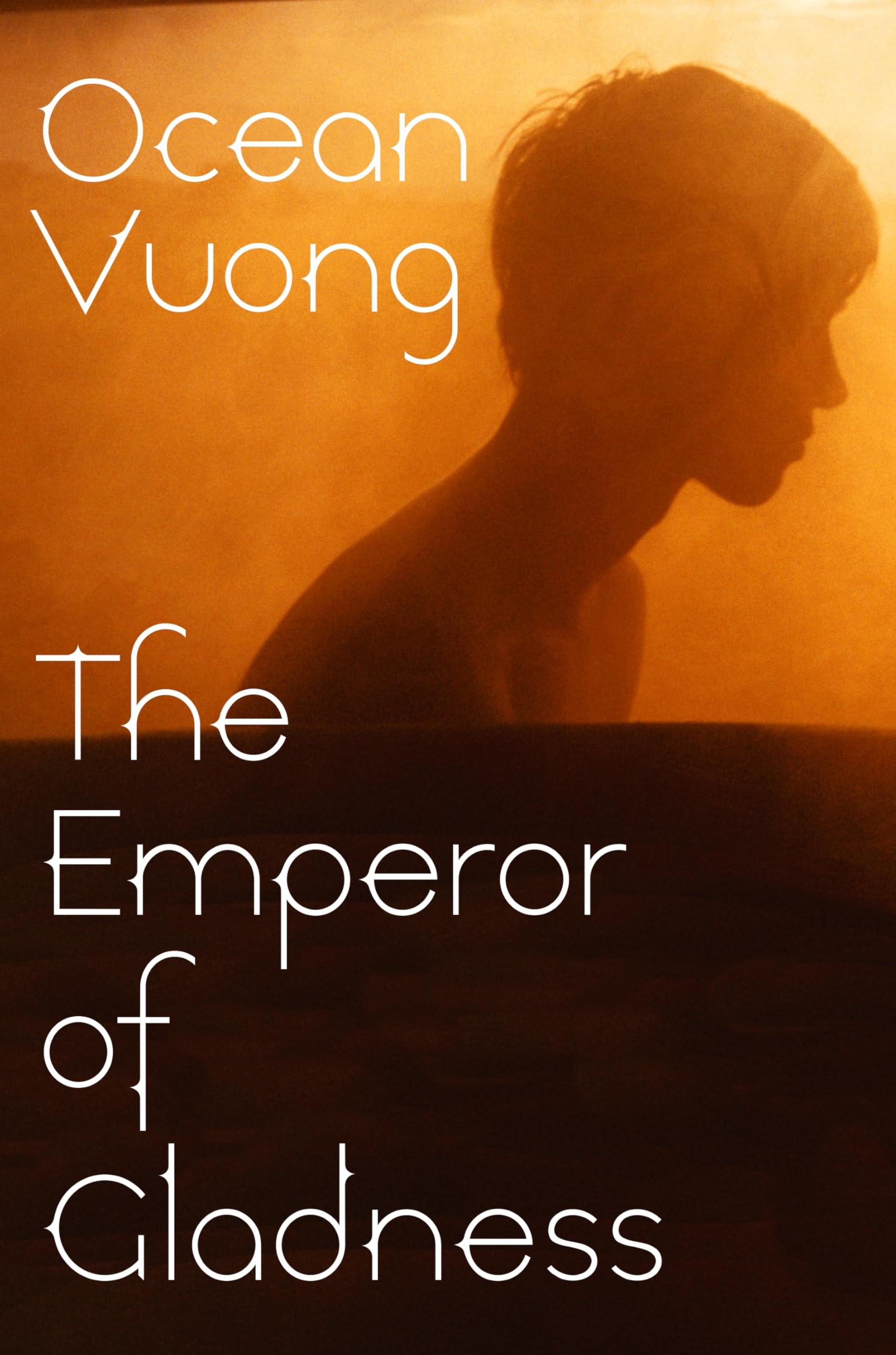An unlikely friendship blossoms between different generations in this moving story that holds America’s underside up to the light.

Ocean Vuong | The Emperor of Gladness | Penguin: £20.00
Reviewed by Edward Heathman
In his second novel, Ocean Vuong has chosen to skate over ground similar to that of his debut, On Earth We’re Briefly Gorgeous. Again, he gives us variations on the immigrant experience, on queer people lost in the inexperience of youth, and on the cost of generational trauma, along with class-struggles. However, this time he forgoes untidy writing and sloppy sex scenes (I never want to read the term ‘cock-clit’ again) to give his characters more of a fighting chance at resonance.
With both novels being set in Connecticut, you might assume The Emperor of Gladness to be an extension of the literary world Vuong previously created, but I would argue this one is rather a reframing of past sensibilities, challenging them with a more direct narrative style and an even deeper psychology, laced with elaborate symbolism for a serious achievement.
Vuong finds all of this in his latest protagonist, Hai. A nineteen-year-old college drop-out you want to root for as he tries to face up to his fractured relationship with his family and substance-abuse issues. In a truly stunning first chapter that reads like something out of the ‘Time Passes’ section of Woolf’s To the Lighthouse, we are given the history of an American town in which ‘We pay taxes on every check to stand on the sinking banks of a river that becomes the morgue of our dreams.’ We then glimpse the novel’s hero making his way to a bridge with the desperate plan to jump.
What could be read as an equally desperate attempt at pathos becomes magnanimous when his suicide attempt is stopped by an old woman living in one of the supposedly abandoned houses on the riverside. When it is revealed that she, Grazina, is suffering from dementia and is also estranged from her family, Hai agrees to become her unofficial live-in carer, and we follow the development of their relationship as one sick person cares for the other, with predictably bleak results.
The novel gets its more colourful and believable scenes when Hai’s neurodivergent cousin, Sony, helps him get a job at HomeMarket, a chain variety store whose café they work in alongside an interesting cast of characters. The job takes Hai on various trips, from crash sites in Vermont, shifts in abattoirs, to amateur pro-wrestling matches (surely inspired by a personal interest Vuong has shared in interviews). Just as BJ, the manager, pours cake mix into the cornbread to add a special taste, Vuong attempts to bring a personal touch to the Great American novel.
Where canonised writers like John Steinbeck and Carson McCullers have their characters long for (and fail at) their heart’s desires for a good life, Vuong’s Hai is disenchanted by his own potential from the very beginning, telling Sony that ‘goals and promises, they’re all, like, ghosts. For most people, their ghost is inside of them, waiting to float out when they die. But my ghost is in pieces.’ Hai is capable, however, of putting his own pessimism and self-loathing aside to help others, as he does in his attempts to preserve what is left of Grazina’s dignity, offers of support to Sony with his mental health battles, or his decision to champion his colleagues’ hopes for success in other non-conventional careers.
Perhaps, what Vuong is suggesting is that the American Dream is destined to fail if it is based on sole individual ambitions. Despite The Emperor of Gladness having a singular protagonist, it is, at its core, an effort at a community novel that amplifies society’s disenfranchised and neglected.Towards the climax of the story, during a phone call, Hai listens to his mother say that opportunity, was something that ‘never came’ for her, but that when it does come ‘you have to be lucky but also very brave. And I wasn’t either. But you are.’ Vuong casts such earnestness with a dramatic irony, as the reader knows that Hai has nothing going for him (in terms of long-term goals, at least).
And this leads us to question the motives that underlie this unmerciful depiction of America’s working class. There is a scene where Hai and Sony indulge in a joint revelry of pity and call themselves ‘Beautiful short losers.’ Such naked self-reference (Vuong has a poem of this name in his latest poetry collection, Time is a Mother) belongs more to a Taylor Swift song than a critically-acclaimed novel, and while it could be read as a Hitchcockian motif Vuong wishes to employ in his prose (his debut novel also shares its name with a poem from his debut poetry collection), it marks a lapse in emotional gravitas. If Vuong sees his characters as ‘losers’ and has poems in which speakers also refer to themselves as such, is this how he sees himself, even with his literary stardom and glittering academic reputation, not forgetting the financial security that comes with those things?
What for some may be a longer read than they asked for, will be a comforting stretch of an epic to savour for others. The tenderness between Hai and Grazina is the thread that holds The Emperor of Gladness together. One only wishes Vuong had so much tenderness for his own characters.
Reviewed by Edward Heathman
